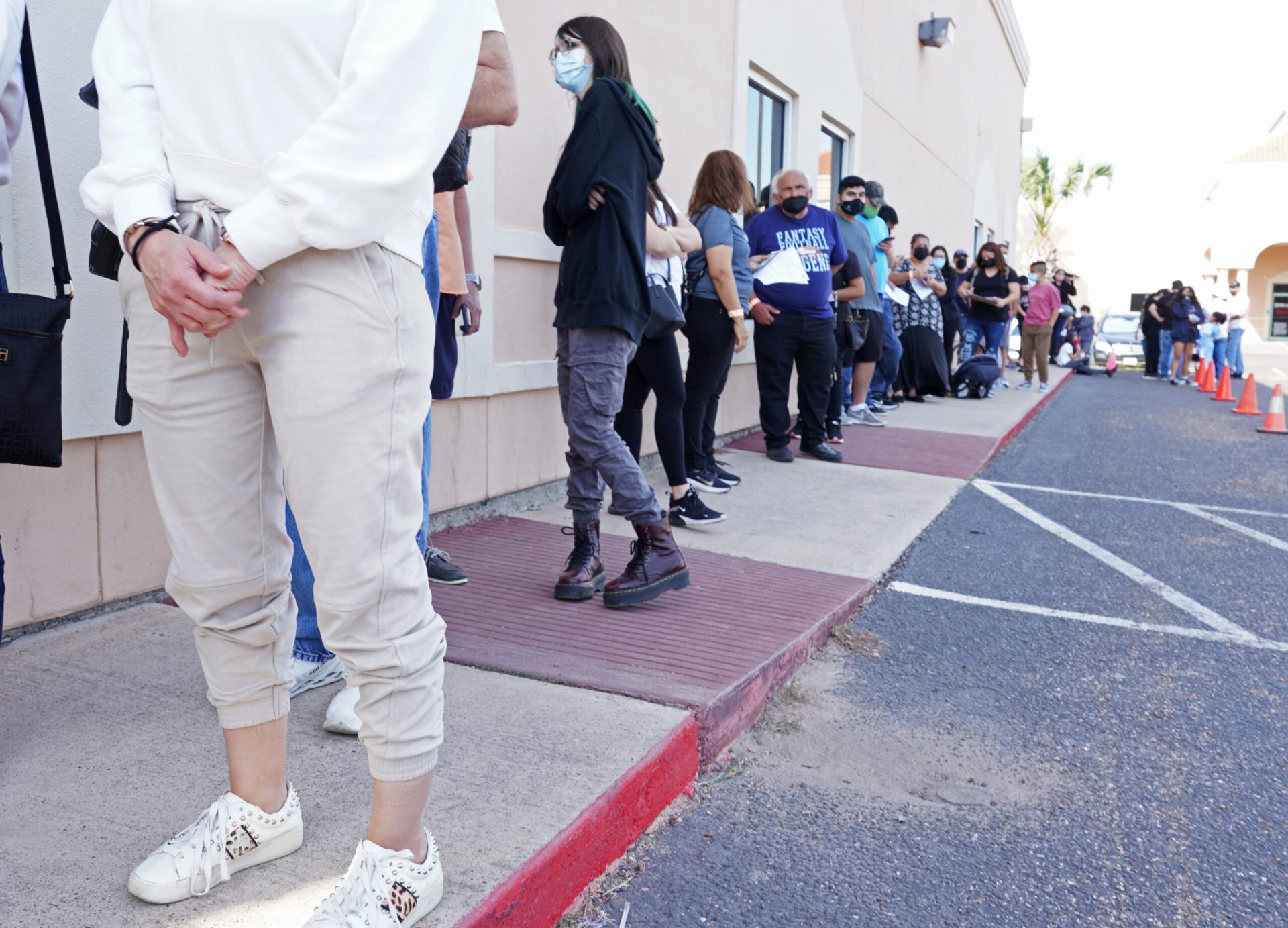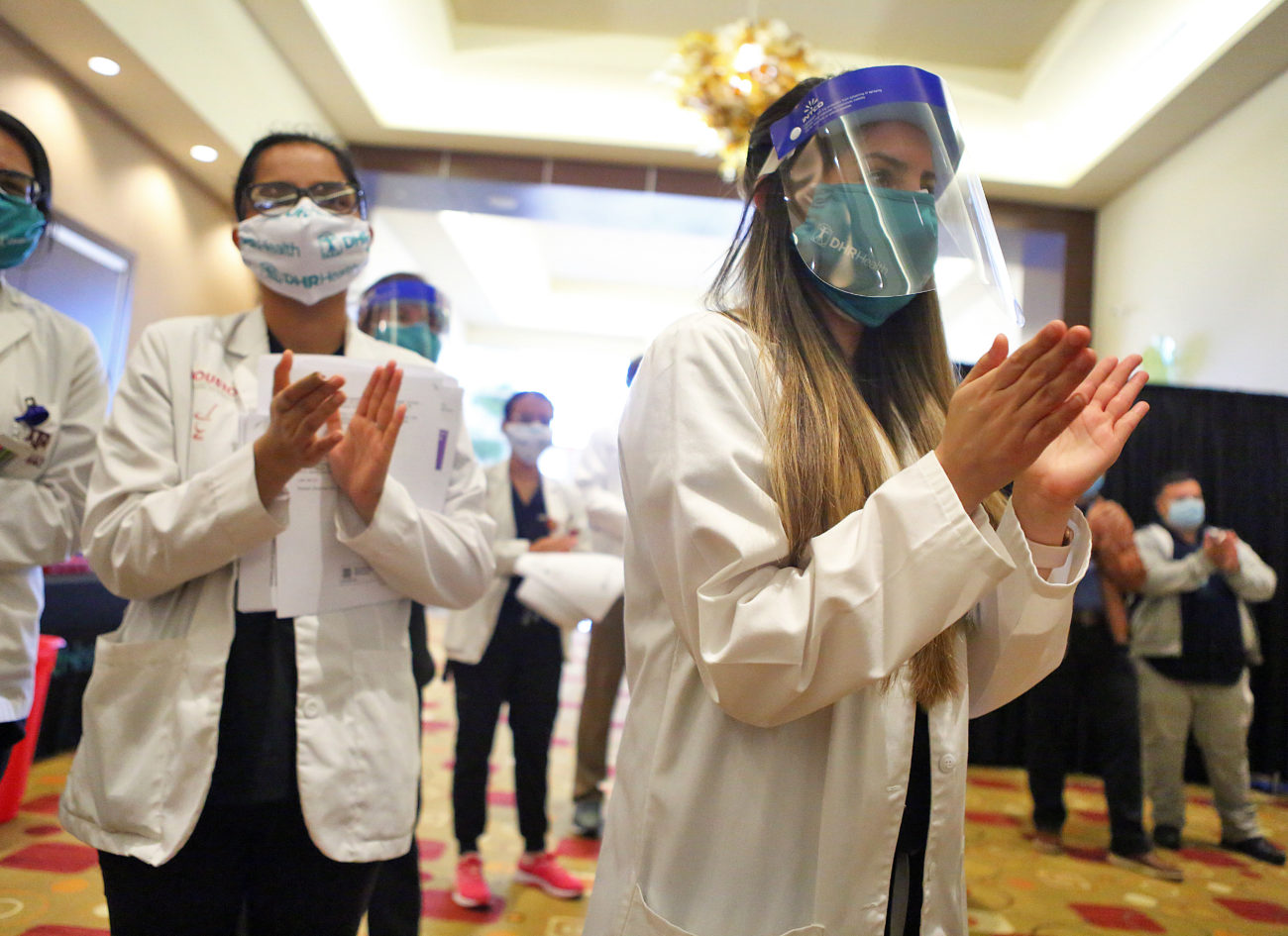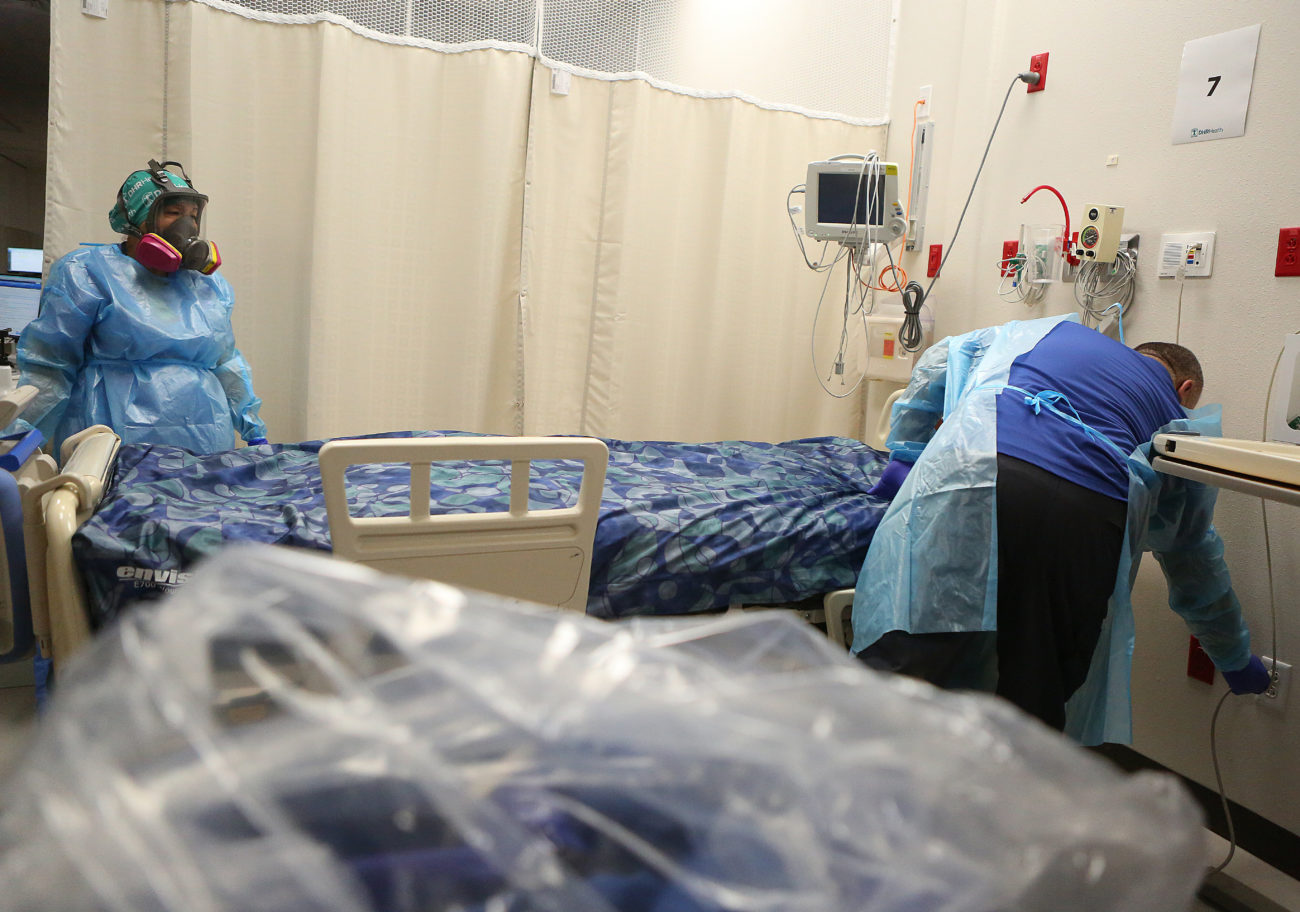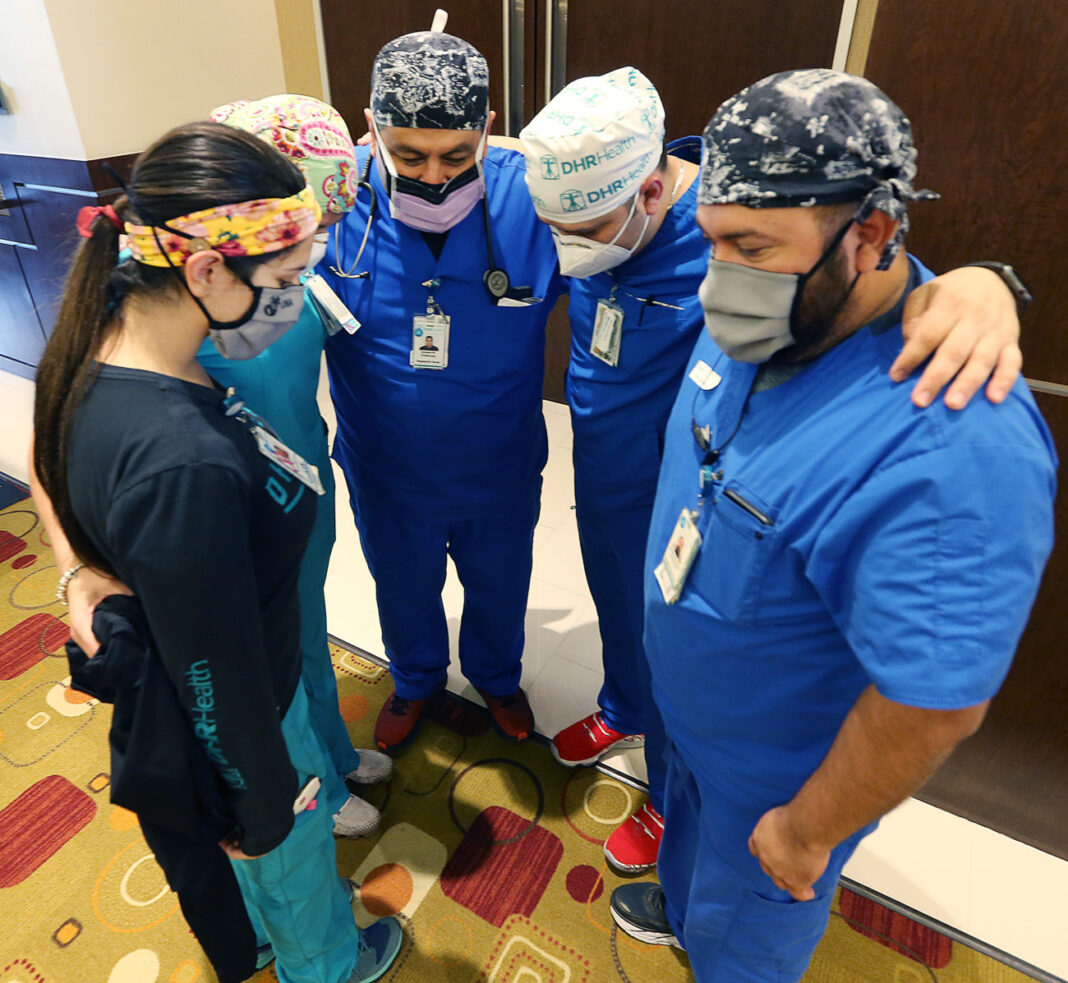|
Only have a minute? Listen instead
Getting your Trinity Audio player ready...
|
Time faded inside Fermin Herrera’s hospital room at Valley Baptist Medical Center in Harlingen. Stricken with COVID-19 and heavily medicated, the Missouri gentleman who for 20 years has called the Rio Grande Valley his winter home lay bedridden for weeks, flowing in and out of consciousness with only thoughts of his wife, Ruth Ann, to keep him grounded.
Fifty days in the hospital, 15 of which on a ventilator, a twilight of perpetual dreariness existed in that room, where even reading the wall-mounted analog clock felt nearly impossible. His stay could have been hours or years — to the 82-year-old whose birthday came and went inside the hospital, there were times when he couldn’t tell the difference.
Speaking Tuesday of what he and his wife endured back in the spring of 2020, Fermin said “the memory you’re speaking of doesn’t happen” when asked for his recollection of the time he laid in a hospital bed for several weeks, fighting for his life.
This sort of phenomena is known widely as brain fog, in which survivors of COVID-19 experience memory loss — sometimes for the entirety of their affliction and even events that occurred immediately prior.
Fermin doesn’t know what to call it, but he does know that there are some things that transcend the unconscious mind, and in his case, that was the people who cared for him: his nurses, doctors and other members of the medical staff.
“It’s funny what I do remember,” a now COVID-free Fermin said Tuesday evening.
He recalls the kindness and attentiveness of the hospital’s front-line workers who toiled over his care. He remembers that vividly.
He remembers they were always there, ready at any minute to attend to his every need. He remembers how quickly they’d “suit up” in protective gear just to enter his room. He remembers how consistently they worked to get him in touch with his wife since family members are not allowed where COVID-19 patients are treated. He remembers it like it was yesterday.
“I never felt abandoned,” Fermin said.
And they never abandoned Ruth Ann.
Heartbreaking stories were told this year of families torn apart by COVID-19, never seeing their loved ones again or having the chance to comfort each other upon being admitted to a hospital because of pandemic restrictions.
That didn’t happen to the Herreras thanks to the staff at Valley Baptist.
“They kept Ruth Ann informed. They connected us so we could talk even though she couldn’t come see me,” Fermin said. “To tell you the truth my appreciation of the medical community comes at how gracious and forthcoming they were with her. I can’t imagine being Ruth Ann and having a husband in such bad shape for 50 days, and yet they kept her going. That is my appreciation for them.”
There are many COVID-19 survivors like Fermin with similar stories — individuals who recall a gentle touch, a smile, a whisper of encouragement from their caretakers, or a considerate staff of nurses who use their cellphones to make video calls to patients’ families, so they can see each other.
In the Valley, where the coronavirus has been responsible for more than 3,000 deaths and what’s trending toward 50,000 cases in Hidalgo County alone by the end of the year, many have looked toward the medical community as the one glimmer of hope in the darkness of the pandemic.
Less than a month ago, newspaper publisher Stephan Wingert announced that The Monitor, The Brownsville Herald and the Valley Morning Star — daily newspapers owned by AIM Media Texas — agreed to name the Valley’s front-line workers in the healthcare industry the 2020 Citizens of the Year.
The announcement broke a tradition of the publications accepting nominations from the community before deciding on the honoree.
He said: “… Front-line workers are our Citizens of the Year. Period.”

A NEW ERA OF CARE
Exact numbers are currently lacking, but health authorities in the Valley have reported the deaths of at least two doctors, dozens of nurses and more in the medical field who succumbed to the virus. These were healthcare professionals who were on the front lines of fighting the disease, risking their lives and losing them in the process.
Since the newspapers named the Valley’s medical community the Citizens of the Year, readers have responded in social media comments and emails with sentiments describing the honorees in various terms: “benevolent,” “sacrifice,” “integrity,” “valuable,” “calming,” “unbelievable,” “amazing,” “passion,” “heart,” “commitment,” “dedication,” “compassion,” and “hero.”
But they all said “thank you.”
Much like military enlistment spiking following the attack on Pearl Harbor in 1941, and after 9/11 in 2001, the 2020 honorees have inspired an increase in enrollment at medical schools in the region.
For the University of Texas Rio Grande Valley’s School of Medicine, that interest in the healthcare field manifested itself this year in the form of nearly 8,000 applications to enter the institution.
This, according to UTRGV Medical School Dean Dr. John H. Krouse, is being observed throughout the nation and since as early as May or June, when the pandemic worsened.
It’s also a sign of what he hopes will herald a new era in America, an era of compassion.
“There are a few people at both poles, but most of us live in the middle. We go about our daily lives and take care of our families and each other,” Krouse said just an hour before UTRGV administered the very first COVID-19 vaccination in the Valley on Tuesday. “I think the one thing we are going to see is that all of us in the middle — the more of America we know — are going to become more compassionate, more human, and take care of each other.
“What we are seeing in the medical school is a renewed increase in humanism, and we see it in others. We are seeing the students interested in that, and we’re modifying our curricula to maximize that, to become those caring and compassionate people in the medical community that we want. I see us being a catalyst in that direction.”
Dr. Jayson T. Valerio, dean for the Division of Nursing & Allied Health at South Texas College, agreed.
In fact, Valerio said Wednesday that STC has seen the same surge of interest in the medical field, with the college’s nursing programs becoming so inundated with qualified applicants that 84 students had to be turned away due to a lack of faculty to teach them all.
“This is the first round of applications that we ever had that increased the number of qualified applicants for both programs,” Valerio said. “When COVID-19 hit us, I was kind of a little pessimistic about the future of nursing, thinking community members and nursing students would be turned off by the pandemic situation. But surprisingly, we had an increase of applicants. As a matter of fact, we’re denying students … there’s so many.
“For as much as we want to accommodate them, we had to turn them away.”
There are two particular applicants whose stories touched Valerio: one who sought the medical field after a family member died of COVID-19, and another who applied for the nursing program after being inspired “by the heroic deeds of the front-line nurses.”
“When the World Health Organization declared last year that the year of 2020 would be the International Year of the Nurse and the Midwife, they were not kidding about that,” Valerio said, noting in jest that “maybe they had a crystal ball.”
He also pointed to Gallup polls showing that nursing has been voted the most trusted, honest and ethical profession for the last 18 years.
“I’m a member of the Philippine Nurses Association of America and we dedicated this year to these unsung heroes, for the medical professionals and especially the nurses, and now we can all see why,” Valerio said.

THE POLITICS OF PRAISE
During a year in which ideological divisions nearly tore apart the country, when even wearing a mask became a source of vitriol and debate, healthcare workers transcended politics.
Upon learning that Valley newspapers named front-line workers the region’s Citizens of the Year, Republicans and Democrats in Texas who couldn’t agree on much of anything in 2020 recently came together on one universal truth: there is no one more deserving.
Take U.S. Sen. Ted Cruz and former presidential candidate Beto O’Rourke, for instance. The two duked it out for Cruz’s senate seat in 2018 with the incumbent coming out on top of a race that often turned bitter.
But when considering the work of medical professionals caring for coronavirus patients inside hospitals that were over capacity, where bodies sometimes had to be stored anywhere they could find room, Cruz and O’Rourke were on the same page when offering their praise.
“I’m so glad that you’re recognizing the medical community and front-line providers, to not only recognize doctors and nurses but also the maintenance staff and janitors, and anyone who ensures care,” O’Rourke, D-El Paso, said Tuesday. “It really is an extraordinary community of providers and front-line workers.”
O’Rourke said he was compelled to speak of the honor especially after witnessing what’s occurring in the El Paso area, where the virus death toll has been so staggering that as many as 10 morgue trucks were stationed in the county and the Texas National Guard called in to help move the dead.
The Valley knows all about such suffering after incurring horrific casualties during the summer. At the time, obituary sections in local newspapers grew by several pages to list the names of the dead, with so many to print that new protocols were implemented to routinely accommodate the enormity of the loss of life.
At least one edition of The Monitor printed more than 100 death notices on a single September day, nearly 10 times the norm.
“I heard so many heartbreaking stories of people who lost loved ones, and the indignity of these mobile morgues,” O’Rourke said of the deaths in the Valley and in El Paso, otherwise distant communities that are now connected in grief. “Listening to what the Rio Grande Valley went through in the summer really brought home to me how serious this was, but also how very heroic these individuals on the front lines are. Knowing those who put their lives at risk helped us to see just how deadly and how bad this could be, and it’s something we are experiencing here in El Paso.”
Cruz, R-Texas, commended doctors, nurses and medical professionals in a statement Thursday that hailed their efforts as courageous.
“While everyday Americans take common sense precautions to mitigate the spread of this virus, our doctors, nurses and healthcare workers have courageously fought on the front lines to treat patients and provide comfort to loved ones battling this disease,” Cruz said. “The health professionals in the Rio Grande Valley are no exception, as they work tirelessly to save the lives of those in their care. I’m grateful for their dedication and resilience and will continue working with my colleagues to ensure our healthcare workers have the support they need as we work to combat the coronavirus pandemic.”
Gov. Greg Abbott was congratulatory in his response to the news, applauding South Texas healthcare workers for answering the call when needed most.
“The Lone Star State is grateful to the Rio Grande Valley medical community for serving on the front lines of the pandemic to keep Texans safe and healthy,” Gov. Abbott said in a statement Thursday. “This year has presented new challenges and the dedication and sacrifice of healthcare workers in the Rio Grande Valley cannot be overstated. Congratulations to the Rio Grande Valley medical community for being named The Monitor’s Citizens of the Year and thank you for answering a higher calling to support your fellow Texans.”
The congressmen who represent the Valley in Washington also found no fault in the designation, with U.S. Reps. Filemon Vela, Vicente Gonzalez and Henry Cuellar expressing in their respective statements similar adoration as their fellow Democratic and Republican colleagues.
“I cannot think of a group of individuals more deserving of the 2020 Citizens of the Year award than our front-line healthcare workers,” Vela, D-Brownsville, stated Wednesday. “In the face of a once-in-a-lifetime pandemic and global uncertainty, these outstanding men and women have selflessly gone to work every day never wavering in their mission to help others, exemplifying compassion, determination and resilience. Many of these heroes have worked countless hours, sacrificing time with their loved ones, their own health, and in some instances, their own lives. Healthcare workers have saved countless lives, and I sincerely appreciate their service to our country.”
Gonzalez, D-McAllen, was sincere in tone when embracing the Citizens of the Year as heroes, a common theme among many who’ve paid tribute to the Valley’s medical community.
“The Rio Grande Valley and Texas have been hit hard by the coronavirus. We owe our front-line workers a huge debt of gratitude. They have been there through it all. Our healthcare professionals and first responders have been an inspiration to everyone in South Texas,” Gonzalez stated Thursday. “I am so grateful for the love and support they have shown to our community in this challenging time. They are our heroes. I thank them for everything they have done and continue to do to serve our region. They have our backs and I will always have theirs. Thank you to the doctors, nurses, first responders and emergency workers and so many others for the role you’ve played in serving our community during this pandemic. You all most certainly deserve to be our Citizens of the Year.”
In his remarks, Cuellar spoke of the expectation in continuing to find relief for an overburdened healthcare industry.
“Throughout this year, we’ve seen so many individuals and businesses from our community step up to address challenges from the pandemic,” Cuellar, D-Laredo, stated Thursday. “However, our healthcare professionals and front-line workers have gone above and beyond to ensure the safety of Rio Grande Valley residents. To every doctor, nurse, technician and more — thank you. You have all courageously protected our communities since day one and I cannot think of a better group to receive this prestigious recognition. As a senior member of the Appropriations Committee, I am committed to delivering additional federal resources for our hospitals and clinics so they can continue to do their critical work during this crisis.”

A LIVING, BREATHING TESTAMENT
From readers to winter visitors to high-profile statesmen, there are few who members of the medical community haven’t inspired to heap acclaim, including Hidalgo County Sheriff J.E. “Eddie” Guerra, who was among the many eager to sing the praises of the Citizens of the Year.
There was a time when the sheriff wondered if he’d ever breathe normally again, let alone sing.
Take into account that the longtime lawman contracted the virus in November and spent eight days inside DHR Health’s COVID unit in Edinburg.
“It feels like you’re drowning; you can’t breathe,” Guerra said Wednesday about how the virus affected him. “I lost 20 pounds because you’d rather breathe than eat.”
Requiring medication to drain fluid from his lungs, there was a point in which he had an episode not unlike an anxiety attack and found himself gasping for air.
“And I remember a nurse sitting down next to me, holding my hand and talking to me to calm me down. You expect family members to do that, but there was no family there. There couldn’t be any family there. They were my family,” Guerra said.
He doesn’t remember many names, nor does he recall how many cared for him or where they were all from, but he does remember having conversations with people he called “Nurse T” and “Nurse Davis.”
“They were just fantastic,” Guerra said, recalling how Nurse Davis purchased pajamas at a local Target one morning so the sheriff could be more comfortable.
There had been a problem with Guerra wearing a hospital gown due to a skin allergy. He broke out in hives.
“That helps a lot with your mental health, and those nurses, they know that and go above and beyond the quality of care they’re trying to do,” Guerra said.
Nurse T helped him in another way, walking him three laps around the building on Thanksgiving to help build more confidence breathing. She accomplished this by slowly dropping the oxygen level on his tank without him knowing, to prove that he could now breathe well on his own.
It was enough for Guerra to not only feel better but eventually be discharged.
“I was able to come home and have Thanksgiving dinner with my wife after eight days in the hospital. I thought I was only going to spend five days there,” Guerra said.
Although they’re more than 700 miles apart and have never met, Guerra and the Herreras, the winter visitors from Missouri, are bound by their experience as survivors, survivors who admire the people who looked after them when they were at their weakest, who gave them strength where there was vulnerability, hope where there was hopelessness, and a family where one couldn’t be allowed.
Ruth Ann Herrera said she and her husband Fermin were so moved by how considerate the staff was at Valley Baptist that they sent the nurses and doctors Christmas cards, and of course plan on staying in touch.
“Fermin would not be here if it were not for Valley Baptist in Harlingen and all the wonderful people there. I know that for a fact,” Ruth Ann said.
The Hidalgo County sheriff isn’t quite certain how he can express the kind of gratitude that’s worthy of the care he received. So he’s going to testify.
His lung capacity is not yet at 100%, and while he’s currently suffering from insomnia — a side effect of the steroids administered — Guerra said he’s feeling better, little by little, and attributes his rate of recovery to the care he received at DHR Health.
“Every day I know I’m getting stronger and stronger, and it’s because of their inspiration,” Guerra said of the medical staff. “They definitely deserve to be Citizens of the Year — I’m a living testament to that.”
The Valley’s three daily newspapers came together to pay tribute to front-line workers, naming them the Citizens of the Year. We spoke with individuals who gave testament of their work amid a global pandemic. Watch to hear what they had to say:




